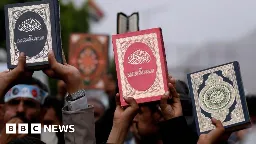Denmark plans jail term for burning Quran in public
Denmark plans jail term for burning Quran in public

www.bbc.co.uk
Denmark plans jail term for burning Quran in public

cross-posted from: https://lemmy.zip/post/1898872
Archived version: https://archive.ph/7EVMt
Archived version: https://web.archive.org/web/20230825172835/https://www.bbc.com/news/world-europe-66602814
